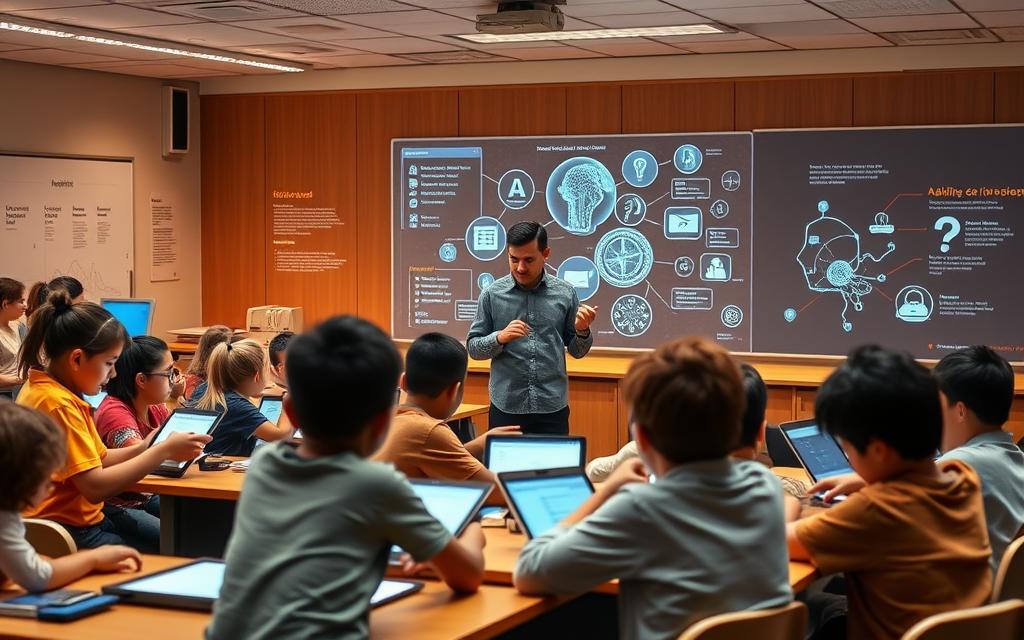The modern education landscape is becoming increasingly demanding, pushing students to seek innovative ways to optimize their study routines and improve their grades. Leveraging AI in education has emerged as a game-changer, offering personalized learning experiences and enhancing academic performance.
With the integration of AI tools for academics, students can now access a range of resources that help them stay organized, manage their time more effectively, and focus on their weaknesses. This not only leads to better academic outcomes but also reduces stress and burnout.
By embracing these technologies, students can improve their academic performance with AI, adopting a more efficient and effective approach to their studies. As we explore the potential of AI in education, it becomes clear that it’s not just about school smarter, not harder; it’s about creating a more streamlined and productive learning environment.
The Modern Student’s Challenges
Students today encounter a myriad of obstacles in their pursuit of academic success. The educational landscape has evolved significantly, presenting both opportunities and challenges.
Information Overload in Today’s Education
The digital age has led to an information explosion, making it difficult for students to sift through the vast amounts of data available. This information overload can hinder their ability to focus on relevant material, leading to decreased productivity and increased stress levels. To overcome this, students need tools that can help them filter and prioritize information effectively.

Time Management Struggles
Effective time management is crucial for academic success, yet many students struggle to balance their academic responsibilities with extracurricular activities and personal life. By leveraging AI tools, students can better organize their schedules, set reminders, and stay on track with their assignments and study plans. This helps in reducing stress and improving overall academic performance.
School Smarter, Not Harder: How AI Tools Can Help You This Academic Year
As we dive into the new academic year, it’s clear that technology is playing a pivotal role in shaping the educational landscape.
The rise of Artificial Intelligence (AI) is at the forefront of this change, offering students innovative tools to enhance their learning experience.
The AI Revolution in Education
The AI revolution in education is transforming the way students interact with academic material, making learning more personalized and efficient.
AI-powered tools can automate mundane tasks, provide real-time feedback, and offer guidance tailored to individual learning styles.
For instance, AI-driven adaptive learning systems adjust their difficulty level based on a student’s performance, ensuring that they are always challenged but not overwhelmed.
Benefits of Integrating AI into Your Studies
Integrating AI into your studies can have numerous benefits, including improved efficiency, better time management, and enhanced learning outcomes.
By leveraging AI tools, students can streamline their workflow, reduce the time spent on administrative tasks, and focus more on understanding and applying the course material.

To illustrate the impact of AI in education, let’s examine a comparison of traditional learning methods versus AI-integrated learning:
| Aspect | Traditional Learning | AI-Integrated Learning |
|---|---|---|
| Personalization | One-size-fits-all approach | Tailored learning experience |
| Feedback Mechanism | Delayed feedback from instructors | Real-time feedback and assessment |
| Time Management | Manual scheduling and reminders | AI-powered scheduling and reminders |
By embracing AI in education, students can experience a more streamlined and effective learning process, ultimately leading to improved academic performance.
AI Writing Assistants for Academic Excellence
AI writing assistants are revolutionizing the way students approach academic writing, offering a range of tools to support every stage of the writing process. These tools are designed to enhance writing quality, improve productivity, and help students achieve academic excellence.
Essay and Paper Writing Tools
When it comes to essay and paper writing, AI tools can be incredibly helpful. They can assist with brainstorming, outlining, drafting, and polishing written work.
ChatGPT for Brainstorming and Outlining
ChatGPT is a powerful tool for generating ideas and creating outlines for essays and papers. By providing a prompt or topic, students can receive a detailed outline to guide their writing.
Grammarly and ProWritingAid for Polishing
Tools like Grammarly and ProWritingAid are essential for refining and polishing written work. They offer grammar and spell checks, as well as suggestions for improving clarity and style.
Research Paper Assistants
Research paper writing can be a daunting task, but AI assistants can make it more manageable. They can help with literature reviews, citation management, and more.
Elicit and Consensus for Literature Reviews
Elicit and Consensus are AI tools that can aid in conducting literature reviews by identifying relevant studies, summarizing findings, and organizing the information.
Citation Generators and Bibliography Tools
Citation generators and bibliography tools can save students a significant amount of time by automating the process of formatting citations and references.
Language Learning and Translation Tools
For students who are non-native English speakers or those learning a new language, AI-powered language learning and translation tools can be invaluable. They can help improve linguistic proficiency and facilitate communication.
| Tool | Function | Benefit |
|---|---|---|
| ChatGPT | Brainstorming and Outlining | Generates ideas and creates detailed outlines |
| Grammarly | Grammar and Spell Check | Improves writing clarity and reduces errors |
| Elicit | Literature Review | Identifies relevant studies and summarizes findings |
Learning Enhancement with AI
The integration of AI in education is enhancing learning experiences by providing personalized learning opportunities. This section will explore the various AI-powered tools and platforms that are making a significant impact on how students learn.
Personalized Learning Platforms
AI-driven personalized learning platforms are revolutionizing education by catering to individual learning needs. These platforms use complex algorithms to understand a student’s learning style and pace.
Adaptive Learning Systems
Adaptive learning systems adjust the difficulty level of course materials based on a student’s performance, ensuring that they are always challenged but not overwhelmed.
Customized Study Materials
AI can generate customized study materials tailored to a student’s specific needs, making studying more efficient and effective.
AI Tutors and Study Companions
AI tutors and study companions are providing real-time support to students. They offer guidance and help students understand complex concepts.
Subject-Specific AI Tutors
Subject-specific AI tutors are designed to assist with particular subjects, such as mathematics or language arts, providing detailed explanations and practice problems.
Conversational Learning Assistants
Conversational learning assistants engage students in interactive learning sessions, making the learning process more engaging and fun.
Visual and Interactive Learning Tools
AI-powered visual and interactive learning tools
are making learning more engaging. These tools include interactive simulations, virtual labs, and gamified learning experiences that help students grasp complex concepts more easily.
By leveraging these AI-powered learning enhancements, students can enjoy a more personalized, interactive, and effective learning experience.
Productivity and Organization Tools
As the academic year kicks off, students are discovering the power of AI-driven productivity and organization tools. These innovative solutions are designed to help students manage their time more effectively, stay organized, and ultimately achieve academic success.
AI-Powered Note-Taking Applications
Note-taking is a crucial aspect of learning, and AI-powered applications are making it easier than ever. Tools like Evernote and OneNote utilize AI to help students capture, organize, and review their notes more efficiently.
Voice-to-Text and Summarization Tools
Some AI note-taking tools offer advanced features such as voice-to-text functionality and automatic summarization. These features allow students to capture information hands-free and get a quick overview of their notes. For instance, voice-to-text capabilities enable students to dictate their notes, which can be particularly useful during lectures.
Visual Organization and Mind Mapping
AI-powered note-taking apps also offer visual organization and mind mapping features. These tools help students to create a visual representation of their notes, making it easier to review and connect different concepts. This can be particularly helpful for visual learners.
Smart Study Schedulers and Reminders
Staying on top of assignments and deadlines is a significant challenge for many students. AI-driven study schedulers and reminders can help. Tools like Trello and Google Calendar use AI to suggest optimal study schedules and send reminders, ensuring that students never miss a deadline.
Project Management for Group Assignments
Group assignments are a common requirement in many academic programs. AI-powered project management tools can facilitate collaboration and productivity among team members. Platforms like Asana and Slack help teams stay organized, assign tasks, and track progress, making it easier to complete group projects successfully.
By leveraging these AI-powered productivity and organization tools, students can streamline their study processes, reduce stress, and achieve better academic outcomes. Whether it’s through more efficient note-taking, smarter scheduling, or enhanced collaboration, AI is set to make this academic year more productive than ever.
Balancing AI Assistance with Academic Integrity
With AI tools becoming more prevalent in academic settings, it’s crucial to strike a balance between leveraging technology and upholding academic integrity. AI can significantly enhance the learning experience, but it also raises important questions about the ethical use of such tools.
Understanding the Ethical Use of AI in Education
The ethical use of AI in education involves understanding when and how to use AI tools appropriately. Students must be aware of the guidelines surrounding AI assistance and ensure they are not misusing these tools. For instance, using AI writing assistants to generate entire essays would be considered a violation of academic integrity.
Maintaining Critical Thinking While Using AI Tools
While AI can aid in research and organization, it’s essential for students to maintain their critical thinking skills. Over-reliance on AI assistance can hinder the development of these skills, which are crucial for academic success. By using AI tools judiciously, students can enhance their learning while preserving the authenticity of their work.
| AI Tool | Ethical Use | Potential Pitfall |
|---|---|---|
| AI Writing Assistants | Grammar and syntax correction | Generating entire essays |
| Research Assistants | Aiding in source identification | Plagiarism through unattributed use |
By being mindful of the ethical implications and maintaining a balance between AI assistance and personal effort, students can ensure they are using these tools responsibly.
Conclusion: Embracing AI for Your Best Academic Year Yet
As the academic year unfolds, students can harness the power of AI to achieve academic success. By embracing AI, learners can optimize their study routines, improve their performance, and reach their goals. AI tools offer a range of benefits, from enhancing writing and research skills to streamlining organization and productivity.
To have your best academic year, it’s essential to explore the various AI tools available. Whether it’s AI-powered writing assistants, personalized learning platforms, or smart study schedulers, these innovations can help students stay ahead. By leveraging AI capabilities, students can work smarter, not harder, and achieve their full potential.
As education continues to evolve, embracing AI is crucial for students to stay competitive and successful. By integrating AI into their academic routines, learners can unlock new opportunities and make the most of their educational journey.







